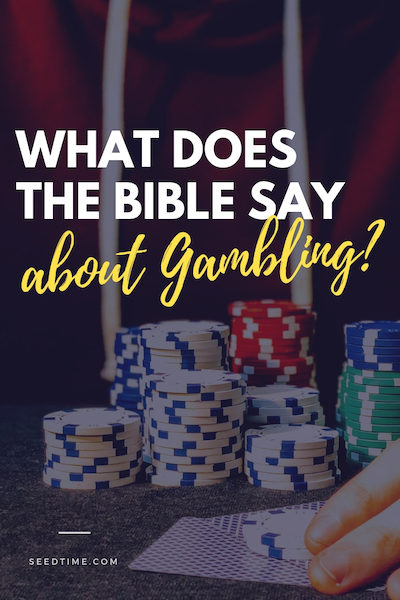
Is Gambling Biblically Wrong
Answer: Although the words 'gambling' or 'lottery' are not in the King James Version Bible, numerous verses denounce the attitudes that are behind them. They include idol worship and greed, which are the foundations that encourage this kind of behavior.

People often indulge in gambling, be it playing the lottery or going to a casino, because they hope to 'get lucky.' Scripture states that such things as fortune, fate, luck and destiny are as foreign gods in whom the people foolishly place their hope.
The Eternal clearly states that not only does not like the attitude behind gambling he is willing to punish people for indulging in such foolishness. Through the prophet Isaiah he states, 'But you who forsake the LORD . . . who prepare a table for Fortune, and who furnish the drink offering to Fate, Therefore I will destine you to the sword; and you will all bow down to the slaughter . . .' (Isaiah 65:11 - 12, HBFV).

The Bible doesn't directly address gambling and such silence provides the fertile ground for discussion and disagreement. Opinions on the propriety of gambling range from acceptance in moderation. In fact, gambling is the fastest growing addiction in America. Like alcoholism and drug addiction, compulsive gambling is costly to the economy. Families are the ones who suffer the most. Many people feel gambling is only a game that is fun, but the Bible tells us this evil is a terrible sin that will lead to poverty. The Hidden Traps of Gambling.
The TEV Bible translation of Isaiah 65:11 states that those who reject our Creator worship gods of 'luck and fate,' the two primary characteristics that underpin gambling. A passage in the book of Proverbs states, 'Worthless, wicked people go around telling lies. They wink and make gestures to deceive you, all the while planning evil in their perverted minds . . .' (Proverbs 6:12 - 14, TEV).
The CEV translation states that liars go around 'winking and giving signals' to deceive others. Such signals between people are the same kinds of stereotypical signs often associated with those seeking to tip the gambling odds in their favor.
One of the deceptive beliefs behind gambling is that by making a small 'investment' one can become rich. This attitude leads to what the word of God defines simply as GREED. Games of chance where money is involved also encourages the false notion that a person can get something for nothing. Being greedy is ultimately a waste of time and distracts a person from what is truly important in life.
/GamblingGettyImages-480836971-5703bff65f9b581408ade217.jpg)
Someone once stated that the person who dies with the most toys (cars, houses, other possessions) wins at life. It is this type of materialistic drive and the desire to have more that helps fuel an obsession with gambling. The world's wisest man, Solomon, stated several times how foolish is was to pursue riches (Proverbs 23:5, 27:20, 24).
Is Gambling Biblical
One day a person shouted to Jesus from a crowd asking him for help in dividing a family inheritance between him and his brother. Jesus' sharp, to-the-point response first stated that his purpose on earth was not to be a judge or arbitrator between people to settle their disputes.
The word 'arbitrator' used in the NASB and other translations for Jesus' response in Luke 12:14 come from a Greek word whose meaning is very similar to the word 'destiny' in the Hebrew. Both words have in common the same concept of portioning out or dividing that gambling businesses partake in when they take the wealth of one person and give it to someone else.

Jesus warned the man who screamed for his help to be wary of covetousness (greed) since God never intended a person's life revolve around the accumulation of physical things (Luke 12:15). He then gave what is known as the parable of the foolish rich man who built bigger barns (verses 16 - 21).
The book of Jeremiah also warns us not to be 'greedy for gain' (Jeremiah 6:13, 15). In short, the Bible says that gambling, especially with our hard earned money, is something we should not pursue or indulge in.
Lottery is susceptible to fraud, despite the high degree of scrutiny offered by the organisers. One method involved is to tamper with the machine used for the number selection. By rigging a machine, it is theoretically easy to win a lottery. This act is often done in connivance with an employee of the lottery firm. Methods used vary; loaded balls where select balls are made to popup making it either lighter or heavier than the rest. Many other ingenious methods too have been employed.
Some advance fee fraud scams on the internet are based on lotteries. The modus operandi of this fraud is that the trickster sends spam to all email users in their database congratulating them on their recent lottery win. Then they proceed to announce that in order to release funds they must part with a certain amount (as tax/fees) as per the rules or risk forfeiture.
Another form of lottery scam involves the selling of 'systems' which purport to improve a player's chances of selecting the winning numbers in a Lotto game. These scams are generally based on the buyer's (and perhaps the seller's) misunderstanding of probability and random numbers. SOURCE